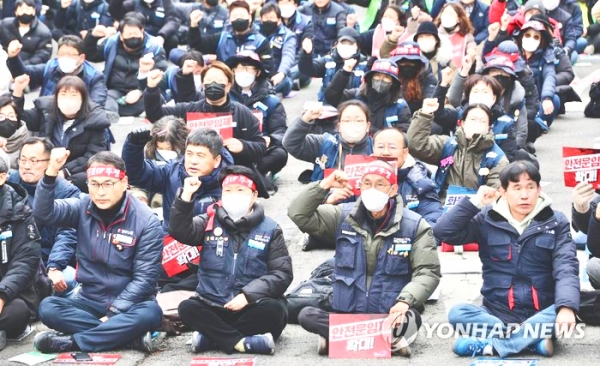
On Dec. 9, 62% of the cargo truckers who belong to the Korea Cargo Workers Union (KCWU) voted to end their strike as it entered the third week with the government refusing to budge, emphasizing the action had caused tremendous damage to the Korean economy. The strike began on Nov. 24, demanding that the minimum freight rate system set to expire at the end of this year be extended and expanded to include other freight types. The minimum freight rate system, which guarantees basic wages for truckers, was introduced in 2020. The system was set to prevent truckers from being overworked and trucks from overloading, and to avoid work-related accidents within truckers carrying imported and exported cement and cargo merchandise. Yet the effect of the system is insignificant, the KCWU refuted that the scope of application was narrow and the implementation period was too short, so it has not produced a visible effect. It argues that extending and expanding the system will result in a significant traffic accident rate decrease.
The KCWU is a labor union formed by individual truckers. Cargo truckers are mainly categorized as Special Laborers. For this reason, there are cases where it is difficult for truckers to receive protection from the Labor Standards Act or even labor rights. To solve such a problem, there was a need to form a labor union, and in 2002, the KCWU was launched and joined the Korean Confederation of Trade Unions. The KCWU has held several strikes since its formation. The recent strike related to the minimum freight rate system was a continuation of the strike that occurred earlier this year. In June, the truckers on strike argued that rising fuel prices were a threat to them and demanded the extension of the minimum freight rate system. On June 12, the Ministry of Land, Infrastructure, and Transport (MOLIT) and the KCWU negotiated and tentatively agreed to “extend the minimum freight rate system.” However, just before the settlement, the People Power Party (PPP) reversed the agreement, and the MOLIT failed to persuade the PPP.
As of Dec. 31, 2022, the expiration date for the minimum freight rate system nears, the ambiguity of the previous negotiation was brought to the surface. In the recent strike, the truckers demanded the abolition of the “sunset” provision that would allow the system to be effective only until a specified expiration date. The KCWU also requested the minimum freight rate system to remain permanently and the expansion of the system’s benefits to truckers carrying other cargo than cement and containers. However, the Yoon administration agreed to temporarily extend the expiration just for another three years and rejected to expand the scope of the system. Sung Il-jong, the PPP’s policy chief, stated that such a decision was made since the income rates of the truckers in the industries that the KCWU demanded to expand the minimum freight rate system to are relatively high. Sung said, “If the minimum freight rate system is applied to those truckers too, the public should take on a more logistics cost burden. To minimize public burden, we have decided not to expand the system to other freight types.” Sung added, “The purpose of the system, which was to ensure traffic safety, seems to be unclear. Thus, further verification of this system is needed, hence the extension of the sunset clause. Also, with oil prices being so high, we have considered the opinion of relevant parties, which is why the sunset provision has been extended by three years.”
Since Korea’s cargo transportation is based chiefly on road transportation, the influence of the KCWU on Korea’s transportation industry is enormous. According to the Korea Economic Research Institute, the strike this year has negatively affected the Korean economy of about 10.4 trillion KRW. Considering the economic loss, on Nov. 29, the Yoon administration announced a “back-to-work order,” a compulsory order that forces striking workers back to work, with noncompliance punishable by a sentence of up to three years in prison or fines up to 30 million KRW. The Yoon administration announced several more “back-to-work orders” during the strike. On Dec. 6, the KCWU filed a lawsuit against the Korean government’s invocation of the back-to-work order, demanding the retraction of the order. There are some perspectives that the “back-to-work order” was an overreaction, leading the situation to become a “chicken game”. There are also perspectives that the strike was a tremendous loss to the Korean economy, so the “back-to-work order” was proper.


